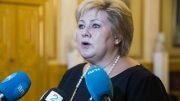The corona pandemic has allowed more people to go through education from home. That is also what the Prime Minister and the Minister of Research want to continue after the pandemic.
“I would like to learn more programming,” Prime Minister Erna Solberg (H) told news bureau NTB.
She believes that everyone could use some further education. And for those like her, who are well-established somewhere, moving to a new city to study full-time is not easy.
Therefore, the Prime Minister and Minister of Research and Higher Education Henrik Asheim (H) are now starting work on a new strategy to put in place more flexible and so-called decentralized study offers, where more of the teaching can go digital.
“It is not just the 19-year-old who is the future student. It is also the 40-year-old who chooses to build on what they already know,” Solberg said.
More available
Asheim never completed his studies and can imagine doing it digitally sometime in the future.
He believes that the universities and colleges of the future must, to a greater extent, make themselves available to people in all phases of life.
“Through corona, we have actually learned a little. The universities and colleges quickly set up a number of new courses that could be combined with people who were actually in full-time jobs,” he said.
Now he wants to see more of that.
“The strategy is not a corona measure. It will gather the examples we have today and point forward to how education should be made available to people all over the country in different life situations,” he told NTB.
New investment
The government has already set aside NOK 132 million to develop flexible education offers in this year’s state budget.
And before the summer, they will present their new strategy on decentralized and flexible education for the years to come.
Work on the strategy kicks off when Solberg and Asheim meet all universities and colleges on Tuesday for the annual contact conference.
“The situation for today’s students, with too much digital teaching during the pandemic, will not be permanent. But for many adults, who need extra education or want to get a new one, it is probably a better offer to follow along digitally than to move to a city,” the Minister of Research and Higher Education said.
The plan is also to be able to offer entire bachelor’s degrees and master’s programs more flexibly so that new, young students also have the opportunity to take the entire study courses from anywhere in the country.
“If you are in a life situation that makes it difficult, then you can get decentralized education. We just have to take that into account,” Solberg said.
Democratization
The Prime Minister refers to the restructuring as democratization.
“It makes higher education available to far more people than today. There are a number of people who, precisely because of their life situation or for financial reasons, cannot take an entire year off or travel and be somewhere else,” she said.
“It is not the case that everything should be in Oslo. On the contrary, I believe that this provides an opportunity to expand the number of students elsewhere.
“You can have an institution in Tromsø that provides education to the people of Kristiansand. The good professional environments get more legs to stand on when they can deliver an offer to the whole country,” she noted.
Asheim pointed out that Norway spends NOK 40 billion a year on educational institutions.
“They must adapt to the needs of the whole society, and not just be aimed at the full-time student of 20 years of age,” he said.
Source: © NTB Scanpix / #Norway Today / #NorwayTodayNews
Do you have a news tip for Norway Today? We want to hear it. Get in touch at [email protected]





Be the first to comment on "The Norwegian government wants to allow more people to study from home – even after corona"